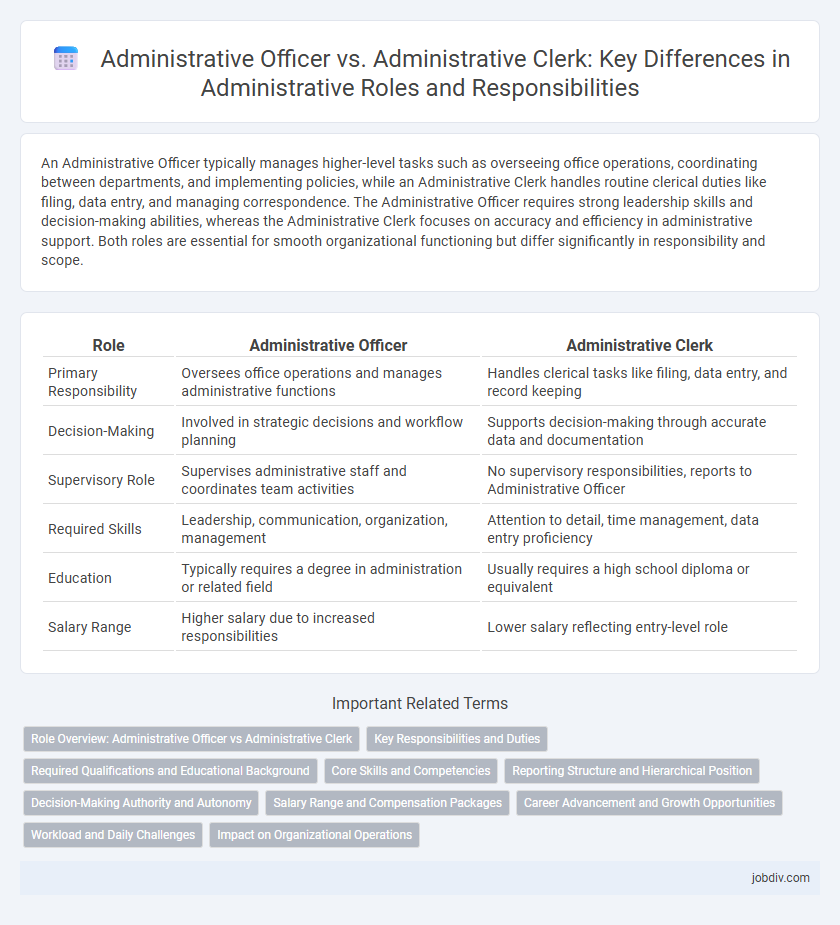An Administrative Officer typically manages higher-level tasks such as overseeing office operations, coordinating between departments, and implementing policies, while an Administrative Clerk handles routine clerical duties like filing, data entry, and managing correspondence. The Administrative Officer requires strong leadership skills and decision-making abilities, whereas the Administrative Clerk focuses on accuracy and efficiency in administrative support. Both roles are essential for smooth organizational functioning but differ significantly in responsibility and scope.
Table of Comparison
| Role | Administrative Officer | Administrative Clerk |
|---|---|---|
| Primary Responsibility | Oversees office operations and manages administrative functions | Handles clerical tasks like filing, data entry, and record keeping |
| Decision-Making | Involved in strategic decisions and workflow planning | Supports decision-making through accurate data and documentation |
| Supervisory Role | Supervises administrative staff and coordinates team activities | No supervisory responsibilities, reports to Administrative Officer |
| Required Skills | Leadership, communication, organization, management | Attention to detail, time management, data entry proficiency |
| Education | Typically requires a degree in administration or related field | Usually requires a high school diploma or equivalent |
| Salary Range | Higher salary due to increased responsibilities | Lower salary reflecting entry-level role |
Role Overview: Administrative Officer vs Administrative Clerk
An Administrative Officer manages higher-level organizational tasks including policy implementation, staff supervision, and strategic planning to ensure efficient office operations. An Administrative Clerk performs routine clerical duties such as data entry, filing, and handling correspondence to support daily administrative functions. The Administrative Officer typically holds greater responsibility and decision-making authority compared to the more task-focused role of the Administrative Clerk.
Key Responsibilities and Duties
An Administrative Officer oversees organizational operations, managing budgets, developing policies, and coordinating department activities to ensure efficient workflow and compliance with regulations. In contrast, an Administrative Clerk handles clerical tasks such as maintaining records, scheduling appointments, and processing correspondence to support daily office functions. Both roles require strong organizational skills, but the Administrative Officer carries greater leadership and decision-making responsibilities.
Required Qualifications and Educational Background
Administrative Officers typically require a bachelor's degree in business administration, public administration, or a related field, along with several years of experience in office management or administrative roles. Administrative Clerks often need a high school diploma or equivalent, with some positions preferring additional certifications in office technology or clerical skills. Advanced communication, organizational abilities, and proficiency in office software are essential qualifications for both roles, but Administrative Officers usually hold supervisory responsibilities and require stronger leadership capabilities.
Core Skills and Competencies
Administrative Officers demonstrate advanced organizational and leadership skills, including project management, policy implementation, and decision-making abilities, essential for overseeing office operations and coordinating workflow. Administrative Clerks focus on clerical competencies such as data entry, document management, scheduling, and basic communication, supporting daily administrative tasks and maintaining records accurately. Both roles require proficiency in office software and strong attention to detail, but the Administrative Officer's skill set emphasizes strategic planning and supervisory responsibilities.
Reporting Structure and Hierarchical Position
Administrative Officers typically hold a supervisory role, overseeing the work of Administrative Clerks and reporting directly to senior management or department heads. Administrative Clerks operate at a more entry-level position, handling routine clerical tasks and reporting to Administrative Officers or supervisors. The hierarchical structure places Administrative Officers above Administrative Clerks, reflecting greater responsibilities in decision-making and team coordination.
Decision-Making Authority and Autonomy
An Administrative Officer typically holds greater decision-making authority and autonomy, responsible for overseeing operations, managing staff, and making strategic organizational decisions. In contrast, an Administrative Clerk performs routine tasks and follows specific instructions with limited discretion or independent judgment. The officer's role demands higher-level problem-solving and policy implementation, whereas the clerk supports administrative functions through detailed record-keeping and data entry.
Salary Range and Compensation Packages
Administrative Officers typically earn a higher salary range, often between $45,000 and $70,000 annually, compared to Administrative Clerks, who generally receive between $30,000 and $45,000. Compensation packages for Administrative Officers often include benefits such as health insurance, retirement plans, and performance bonuses, while Administrative Clerks may have more limited benefits focused on basic healthcare and paid time off. The disparity in salary and compensation reflects the increased responsibilities and decision-making authority associated with Administrative Officer roles.
Career Advancement and Growth Opportunities
Administrative Officers often experience greater career advancement opportunities due to their broader responsibilities in managing office functions, supervising staff, and making strategic decisions. Administrative Clerks typically have more routine tasks focused on data entry, filing, and basic office support, which may limit upward mobility without additional training or education. Pursuing certifications or higher education can enhance growth prospects for both roles, but Administrative Officers generally have a clearer pathway to senior management positions.
Workload and Daily Challenges
Administrative Officers manage higher workloads by overseeing multiple departments and handling complex tasks such as budget planning, staff coordination, and policy implementation. Administrative Clerks deal with routine tasks like data entry, filing, and managing correspondence, often facing challenges related to repetitive work and meeting tight deadlines. Both roles require strong organizational skills, but Administrative Officers typically encounter more strategic decision-making pressures while Clerks must maintain accuracy under time constraints.
Impact on Organizational Operations
Administrative Officers drive organizational efficiency by overseeing complex processes, managing budgets, and implementing policies that align with strategic goals. Administrative Clerks support daily operations through data entry, record maintenance, and routine communication, ensuring smooth workflow and accurate information management. Together, these roles complement each other, with Officers focusing on decision-making and Clerks handling operational details to sustain organizational performance.
Administrative Officer vs Administrative Clerk Infographic

 jobdiv.com
jobdiv.com